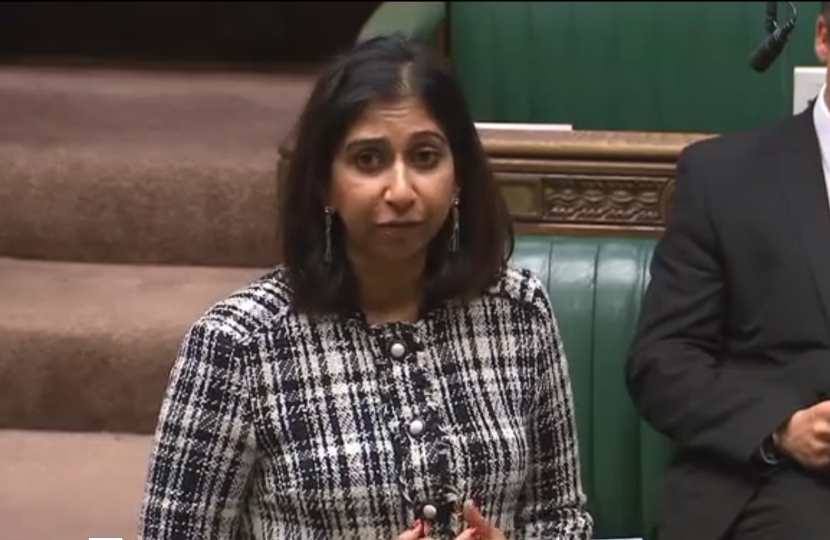
Brexit Update – 15.03.19
This week has seen a number of very important votes on Brexit. On Tuesday, the Prime Minister brought her Withdrawal Agreement and Political Declaration back to the House of Commons for the second time following a postponement earlier this month, and on Wednesday and Thursday, legally non-binding votes were held to establish what MPs’ opinions were on both leaving without a deal and extending the Article 50 process beyond the 29th March.
I know that many people are anxious about the constitutional and political situation, but this week has been unprecedented, unpredictable and fast moving. Over the last six weeks, I have held two public meetings on Brexit attended by over 300 people. This has been useful for me to gauge opinion in Fareham. I have also received scores of emails and letters on the subject. I have applied my own judgement too, based on my time as a minister in the Department for Exiting the European Union.
I campaigned and voted to leave the EU in the 2016 referendum. I was re-elected in 2017 on a Conservative manifesto to honour the 2016 referendum result including leaving the customs union, single market, ECJ jurisdiction and ending free movement of people. That manifesto also pledged that "no deal is better than a bad deal". I have kept those promises in mind as events have unfolded.
Below I have outlined the events of this week and how I voted:
Meaningful Vote 2: Tuesday 12th March
I resigned from the Government in November 2018 and voted against the Withdrawal Agreement in January as I did not consider it to honour the Referendum, namely that the UK would be locked indefinitely into the Northern Ireland Backstop and also the annexation of Northern Ireland, vis-a-vis Great Britain. This was confirmed by the Attorney General’s advice on 13th November 2018. The deal was subsequently rejected by a majority of 230 - an historic number. You can read more about my stance on the Withdrawal Agreement in my previous update here.
Very late on Monday 11th March, after efforts on the part of the Prime Minister and negotiators, the Government released documents purporting to consist of "legally binding changes" to the Northern Ireland Backstop. These did not consist of any changes to the legal text of the Withdrawal Agreement or any replacement of the Northern Ireland Backstop (contrary to the terms of the ‘Brady amendment’ which was passed in February, instructing the government what changes were needed). Notably, there was neither an end date to the Northern Ireland Backstop nor any unilateral right for the UK to leave in its own sovereign manner. Instead, the Government had secured supplementary documents and I was part of a backbench team of lawyers which scrutinised these documents after their publication. Our team concluded that these documents made no material legal difference to the inimical effects of the Withdrawal Agreement and the Northern Ireland Backstop.
The Attorney General provided new advice on Tuesday 12th March confirming that the “legal risk remains unchanged” to the Backstop compared to January. The DUP, our partners in government and whom the Conservatives depend on for a majority, announced that they would not be able to support the deal.
As nothing had changed and no meaningful changes had been secured to the Backstop (meaning that the UK will be locked indefinitely in a Customs Union without any sign of how to leave it) I did not change my vote and I decided to vote against the deal again. The deal was rejected by a majority of 149.
Simply put, the PM’s deal, without any meaningful change, is not Brexit. Why?
a) Free movement of people would continue during the 21 month Implementation Period and during any subsequent extension which would be until the end of 2022 - six years after the referendum. In the Northern Ireland Backstop (which we will likely enter), we have no legal guarantee that the free movement of people will even cease then.
b) We would be trapped in the Customs Union indefinitely with no sovereign ability to leave it.
c) Many aspects of the Single Market would continue to apply indefinitely during the Backstop.
d) The UK would have to follow EU rules and regulations indefinitely during the Backstop, with no say over those rules.
e) The European Court of Justice would continue to have jurisdiction over the UK indefinitely.
f) Although front-loaded, we would continue paying the EU some form of payment for approximately 100 years as part of our £39bn financial settlement.
g) Northern Ireland would be treated as a third country, vis-a-vis Great Britain.
h) We would no longer be a Member State of the EU, have MEPs in the European Parliament or any institutional representation at the EU level, yet be governed by its rules.
Despite the Withdrawal Agreement being a prima facie ‘Brexit’, very soon in the future under this deal, when we are unable to control EU migration, strike Free Trade Deals with the rest of the world, set our own trade tariffs or determine our own regulations, I believe it will be looked back on as a sham. I therefore cannot sign up to this arrangement.
As I have stated in the past, I am willing to compromise and accept many of the unpalatable aspects if the Northern Ireland Backstop contains a right for the UK to leave or a firm end date.
No-deal vote: Wednesday 13th March
In light of the rejection of the Withdrawal Agreement on Tuesday, the House of Commons proceeded with a vote on whether the UK should “take no deal off the table”. I am firmly against doing this as I believe it is vital to maintain our leverage in the negotiations and I do not believe that ‘no deal’ or a WTO-Brexit would be a “catastrophe” as portrayed by many. On Monday, I took part in a debate on this subject hosted by The Spectator alongside Dominic Grieve MP, Nicky Morgan MP and George Eustice MP. You can listen to the debate here.
The original motion on no-deal was preceded by two amendments: the first to rule out no-deal completely, and the second to implement a no-deal transition as proposed in the Malthouse Compromise. You can read more about this proposals in my last Brexit update here. I voted against the first amendment and in favour of the second.
Ultimately, a majority of MPs voted against the Malthouse Compromise and in favour of removing no-deal from the table. Although disappointing, this result is not legally binding. The legal and constitutional position, according to the EU Withdrawal Act, is that we still leave on 29th March, deal or no deal. If the EU and UK fail to reach an agreement, then no-deal would be the legal default.
Astonishingly, Remain-supporting Cabinet members and other government ministers voted against the Government, breaching collective responsibility.
Extension to Article 50 vote: Thursday 14th March
A further motion was debated on the 14th March about whether the UK should request the EU for an extension to Article 50. I voted against any extension to Article 50 as it would not achieve anything except causing more uncertainty for the UK. In addition, we have promised the electorate to leave the EU on 29th March 2019.
Again, this motion was passed by a majority of MPs. They voted in favour of a short extension in the event of a deal being approved or for the UK to ask for a longer extension if no-deal is approved. Like the motion on Wednesday, this was also a non-binding motion. If, for example, the EU refuses an extension, the legal default applies which is leaving the EU with no-deal.
Where are we now?
There is no doubt that we are in a constitutional crisis. The Prime Minister will now seek an extension to Article 50 from the EU, the terms and cost of which are unknown. Any extension requires unanimous agreement from all EU Member States, with domestic legislation also required. Even though only two weeks remain until 29th March, this outcome is a possibility. This will mean that we do not leave the EU on the 29th March, breaking promises to the electorate. Any extension ultimately relies upon the government bringing forward legislation, as only the government can do this. If the government chooses not to propose such legislation, or an extension is not agreed, then the UK will leave on the 29th March without a deal.
The Prime Minister has proposed to bring back her Withdrawal Agreement to the House of Commons next week for a third Meaningful Vote. I will look carefully at any deal, but my view remains that this deal is still insufficient, which means that my position is to vote against it again. I cannot justify supporting a sham Brexit just so that we can technically get out in March. I believe that the WTO-Brexit/no deal is always an option for the UK for the reasons set out above. If the government chooses to extend Article 50, I will oppose it at every opportunity, but it will ultimately be in the hands of the Prime Minister.
I made a promise to the people of Fareham to honour the referendum result. In as far as I can vote on matters, I will not break that promise. Consequent decisions lie largely in the hands of the Prime Minister over which I have little control. There are many potential outcomes and it is far from certain how the next two weeks will turn out.

